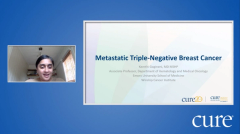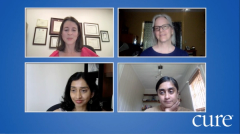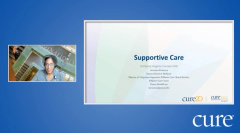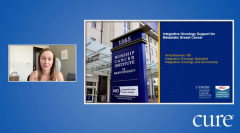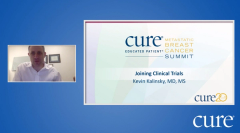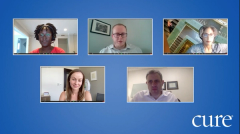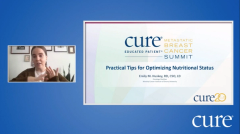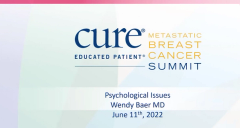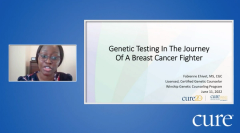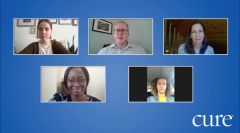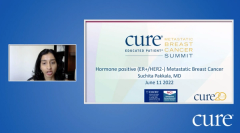
Educated Patient® Metastatic Breast Cancer Summit Additional Care Panel: June 11, 2022
Watch Dr. Kimberly Curseen, Dr. Anna Bausum, Dr. Kevin Kalinsky and Alyncia Mason answer questions about additional care, during the CURE Educated Patient Metastatic Breast Cancer Summit.
This panel was moderated by Ryan McDonald and featured Dr. Kimberly Curseen, Dr. Anna Bausum, Dr. Kevin Kalinsky and Alyncia Mason, from Susan G. Komen.
McDonald: I'd like to start with Dr. Curseen. Somebody mentioned this discussion they've had with their family about educating them on palliative care, hospice care, this difference? And I know you talked about it, but how do you advise patients to navigate the weeds, so to speak, when they're talking with their family about the difference between the two?
Curseen: Now, that's a very good question because it comes up quite often. The visuals are very helpful. And there's a wonderful website called getpalliativecare.org. That website explains it really, really well, particularly for people who are visual learners. The other thing, I'll coach patients to use is one of the techniques we use when we're having our conversation, when they're wanting to have these conversations with their families.
Number one, you have to figure out if your family is ready to have that conversation, making sure that they're in that proper headspace. Set a time as permission, you know, I would like to talk with you about this really submitting time and asking a critical question of what are your concerns. What is worrying you? Because once you know that, that will help direct the conversation, and then you actually answer the question or address what the fear is. And once you're able to have that on the table, then you as you're speaking that will allow you to tailor your definition, oftentimes, you know, you have people person will promote, have an objection. And you'll keep saying the same thing over and over again, even if it's correct, and it's not reaching, then oftentimes you're not addressing the question or the concern that they actually have. And that can be really helpful.
McDonald: Thank you.
Dr. Bausum, we're all aware of Dr. Google, right? You know, there's so much information out there, people tend to kind of want to find their own home remedies or their own integrative medicine and just start using it on their own. I know you've kind of briefly touched upon it, but why is it so important for patients to visit someone like yourself or, you know, anywhere across the country?
Bausum: So first and foremost, the use of supplements or how supplements are manufactured isn't regulated from the top down. So I think that's one of the first pieces in terms of safety is I really take a critical look, if someone says, “I'm taking magnesium.” That sounds benign, but like what brand? Where did you get it? Because the counterfeit industry, even for physician-grade supplements that have the correct brand label on Amazon alone is in the billions annually. And then other herbs, botanicals, nutrients can be laden with trace residues of pesticides, heavy metals, mold, things that are like negative additions to a routine. So we're taking something that we thought was helping but actually has poisons in it as well.
And then making sure it's coordinated, right? Curcumin, if a little curcumin is good, more isn't always better. Because, say alongside radiation, curcumin has a protective effect against DNA damage. What if, God forbid, the cancer cells preferentially took that up and shielded themselves from the effect we wanted that treatment to have as well. Curcumin, especially at higher doses starts to play with how many opioids are in the dose that you have in your body at any given time. So it really is something that should be coordinated.
And then just other safety concerns like a probiotic. If your white blood cell count is below 2.5, taking a probiotic would put you at risk for having a blood infection that can land you in the hospital. So just it's safety first, and then making sure it's coordinated and appropriate for the treatment you're getting. As well as I tell everyone, if you come to me with anxiety, we're going to talk about lifestyle modifications first because I would feel like I'm not doing my job. Well if I just sent you to go buy a physician-grade supplement.
McDonald: Thank you very much.
Dr. Kalinsky, you highlighted models that can help enable sites to offer clinical trials to patients. Now, this may be similar to the hybrid model you addressed but can you talk About the NCI’s Community Oncology Research Program and how that program aims to bring trials closer to people in the community?
Kalinsky: Yeah, right. So there is a program, the Incore program that really does focus on community sites and having availability of studies for patients. And, you know, even within the NCI structure, the way that it works is there are different cooperative groups like there's SWOG, and there's ECOG, Akron, etc. And within these groups, there's also a focus, because I think that there's a recognition of the fact that, and I referenced this, it's not just large academic institutions that are putting patients on studies. it's really our community oncology colleagues. So, you know, I think that the NCI really is trying to increase the amount of therapeutic and non-therapeutic studies that we're able to offer for patients. And that is one mechanism through this grant mechanism that is out there to try to reach patients beyond just larger academic institutions.
McDonald: Okay, thank you very much.
Alyncia, you work in part to connect patients to resources to help eliminate barriers and reduce stresses during treatment. And one of those things that we're talking about clinical trial participation is transportation resources. You know, transportation is pivotal when trying to participate in clinical trials. So can you talk about what resources are out there for patients to help them in this area?
Mason: Yes. So transportation is a big barrier, whether it's getting through to turn out clinical trials, or, you know, simply getting to treatment. So, as a navigator, we have them in various regions. So we would like to look at, you know, locally, what resources are available, whether it's a cancer organization, whether it's a local organization that wants to provide their transportation services to get patients to and from treatment, we start with them.
And then we also like to focus in care coordination, so working with maybe the center that the clinical trials, that is, if they have services that are available for transportation to get the patients to and from, we like to start there. So we focus on like care coordination, but we also like to look outward at what cancer organizations or local resources are available to get the patient to one that's like off the top of my head, that is a national one would be medical mercy, angels, they help with treatment, we're getting transportation to treatment, and other areas, whether it's, you know, grocery stores, they also facilitate with like getting gas cards, and things like that. And then we also start to look local. The American Cancer Society had the road to recovery, which is not national anymore, but we would like to look local and see what's happening there if it's available. So there are some places that locally have it readily accessible. But nationally, I would say medical mercy angels is one that we definitely rely on.
McDonald: Okay, thank you.
And we had a question come in, kind of, I guess I could gear it toward both doctors. So, you know, there's integrative oncology, palliative care, hospice, someone said, how do I know when to go to which? Do they stand alone? Or is it a partnership?
Bausum: Oh, I'll start off. I think it is a partnership, first and foremost. So all my inter-professional colleagues, be it social work, nutrition, the medical oncologists, the surgeons, we’re always talking behind the scenes about sharing ideas and coming up with plans agreeing on things, coordinating. So it's shared, but I'm also really excited. Dr. Curseen and I will in future when some renovations are actually done here, be co-present in a clinical setting. And I think that's the ideal when it's kind of a one-stop-shop for a patient instead of having to, like chase all sorts of different people down.
Curseen: Yep, that's exactly it. So if a patient was trying to kind of brainwave it, in the ideal world, you would be referred to supportive oncology. And based on the type of support you need, then you would be able to choose from a variety of services that that can best fit your needs. So if you have questions about what's going to be the appropriate supplement, you know, how do I integrate that safely? Then integrative oncology with Dr. Bausum if the question is, I'm just falling apart and everything's wrong, then you're probably going to come see me and supportive care if pain is the issue. And, and you're open to procedures, and some of the wonderful things are cancer pain providers have been cancer pain. So sort of think about supportive oncology is the umbrella. And underneath that umbrella, fortunately, we have several different services that could help at any time. So you don't have to know what you you and your oncologists have to know is that you need extra support that they can't provide there. You come to us, and we'll help get you to the right place.
McDonald: Okay, thank you.
Going back to Dr. Kalinsky about clinical trial participation. There was some questions kind of coming in around this area. But you know, some people are curious, do you have to progress on standard care before you're eligible for a clinical trial?
Kalinsky: It depends on the clinical trial. So some of the phase 1 studies require that a patient has received all of the treatments that have been shown to give a patient benefit. For instance, if there's drugs, and sometimes it specifically states, just as an example, if a patient has metastatic, there are a number of drugs that we know make, like give survival advantages, patients live longer if they receive those drugs. So if it's a drug that's newer, it's required that a patient has received those drugs. However, there are also some studies that may be looking at, like, for instance, within HER2, for instance, which was the drug that was presented at ASCO (2022 Annual Meeting) that really furthered the paradigm of how we'll be treating patients. There's some studies that are looking at giving it earlier, and those don't require progression on a trial. And the other thing, and I'm just gonna get on my soapbox again for a second. And this is something that I know from the advocacy perspective, but also from the provider perspective, we need to be increasingly clear about is that patients don't progress on a cancer under treatments, right? They don't fail a treatment, their cancer is no longer progressing on that treatment. And I know that it's a nuance, but I think from the patient perspective, that's a really important thing, right? Because it's about the treatment doing what we hope for it to be good.
McDonald: Okay, thank you, Dr. Kalinsky.
Alyncia, another question kind of coming in. And if this kind of fits with anybody else, as well feel free to jump in, but you know, what resources are available to help people find supportive care or psychosocial resources in their local communities, outside of those like big institutions?
Mason: Right, so I would like go to Komen.org. And I would one, like get attached with a patient navigator, because they're going to be really local. So like me, I work in the Midwest. So there are some that automatically come to my mind, whether it's, you know, the cancer community support, and there's like a different areas, and they would have information on, you know, supportive services in that area, I would be interested, like, I really like these kinds of resource repositories, you know, like getpalliative.com, or clinicaltrials.gov, because they're all like one place where a patient can go, if they have any questions, if they want to get information. I like those. And a lot of times you put in your zip code, or whatever, just to like kind of narrow it down to a certain area.
I would be interested if there is more of like a greater hub available for integrative services or supportive care where one could put in their zip code. But as patient navigators, we do that work as like, let's look at our local areas, something there, you can go and talk to someone, a lot of people really liked that. So that's what we do. But if there is any general information on like a website, we always start that way. And then we kind of narrow down we want to have that soft handoff. So there's none off the top of my head. Unless you're in the Midwest, I would definitely start there. And then I do know that Cancer Support Community has a hub where you can put in your zip code and see if one's in your area. But definitely get attached to a patient navigator and they're going to have a lot of that local resources for you.
McDonald: Okay, thank you.
It's kind of question maybe for everybody, but I'll direct it first to Dr. Curseen. It's about insurance, right? And, you know, Medicaid and everything like that. So, you know, how is palliative care services covered in terms of insurance?
Curseen: That's a very good question. So palliative care is covered, just like any of your other medical specialties would be covered. So Medicaid will cover a palliative care physician, and the team that comes with the palliative care provider. Some of them may be able to bill but not always, so many of those teams are highly subsidized, but their ability to access palliative care in the hospital, at home, and the nursing home or an outpatient clinic is usually paid for by your primary insurance. Sometimes it does require a prior authorization. So if you have an insurance that for each subspecialist that you see, requires a prior authorization. As long as you know that we do that all the time, in our in our clinics as well.
McDonald: Okay, someone mentioned that they're going to become unhoused. But they still need to find a safe space for treatment. What's available for them, or people in these situations to help them you know, locate places to stay?
Mason: Yes, so our navigation services assist with that as well. Housing is an issue everywhere. So I will always say that. However, there are navigators in Los Angeles who can help. One resource that we say especially for patients going through treatment, you're not sharing walls or maybe you want someplace that is more secluded is Joeshouse.org. And they are another great resource to either partner with like Airbnbs hotels, or things like that, where you may be able to go to treatment and have a place as far as long term though. That's where navigators really do that work of finding you a place are finding programs to get you connected to housing. So for short term, I would definitely recommend Joe's House and then for long term, get in touch with your care navigator. Navigators just do an excellent job at connecting you to programs housing programs in the area.
McDonald: Okay, thank you very much. Dr. Kalinsky a question came in. I guess this would necessarily be outside of clinical trials, per se. But how do patients and their doctors get access to investigational drugs if they don't qualify for a clinical trial?
Kalinsky: Yeah, that's a great question. If there is a drug that is approved, but not approved for that particular indication, let's just say, there's a drug that's approved in melanoma that is not quite approved in breast cancer. Sometimes we can work with the company, if we find that the other treatments haven't helped, you know, standard treatments haven't helped to try to get access to that drug. Sometimes, we that's called a single patient IND, investigational new drug, and we just submit to our IRB, a single patient IND and that's how we try to get access to that drug. So that is a mechanism for some patients with some drugs.
McDonald: Okay, thank you very much.
Dr. Bausum, we have a question about vitamin C and its use is integrative medicine. Can you tackle that?
Bausum: Sure. So vitamin C in the integrative medicine space. I'm assuming that this person means IV vitamin C at higher doses. Probably so oral vitamin C supplementation has an antioxidant mechanism of action just general good for our immune system helping bridge the nutrition gap.
Maybe high dose Vitamin C is given in an IV bag. So it's very it's a slow procedure because of the concentration, the grams anything above a 10 (milligram) or even 25 milligrams a bag. Your provider should be running a G6PD blood test first to make sure you're not G6PD deficient and then I'm kind of in straits when the vitamin C has its effect. So vitamin C at high doses has a pro oxidant effect, which in the cancer space is off, we do not have it here at Winship. But it's offered at other Integrative Medicine Centers, or even out in the private practice world where bags of 50 milligrams, 75 (milligrams), 100 (milligrams) have this pro oxidant effect, that through the uptake, the mechanism, which are the molecule is very similar to glucose. So it's preferentially taken up metabolically at faster rates by the cancer cells, and creates this pro oxidant effect that causes the tumor cells to die, helps with treatment-related side effects, helps with fatigue as well as kind of being an add-on in the integrative medicine space for boosting anti-cancer actions in the body, if you will, is we see that people need it frequently, though. So when you really commit to it, you're talking about one, two bags a week minimum for a number of weeks, and then especially in the survivorship space, there's not clear guidelines around when is it enough? And how do we dose? How do we set you down? And what's done most in practice, because the evidence just isn't there yet, is if you're stable, they start to walk the frequency of those out a little bit more. And if things stay normal, we're good. And then we take that next step.
But the guidance there is just a little bit murky, because we do see that sometimes when people come off, there was a robust recurrence, something was working, but we just don't know like, to what degree are we giving you too much vitamin C or having you pay too much out of pocket for this therapy that we don't know, the frequency being appropriate for.
McDonald: Okay, thank you very much.
We're getting close to running out of time. But I wanted to get this question in there for Alyncia. A question came out from the audience. If you know your cancer center, or your doctor doesn't necessarily have a care navigator, what resources are out there to help you find one?
Mason: Yes, I would go to Komen.org. And they have so we work remotely so we're not associated with either your hospital centers however, we do work with, you know, your social workers in the hospital but Komen.org under patients and caregivers and you can get connected to a patient navigator there. And whether it's you know, working nationally or we want like something more locally, we can help find for you or we can just help you that way.
Transcription edited for conciseness and clarity.
For more news on cancer updates, research and education, don’t forget to

